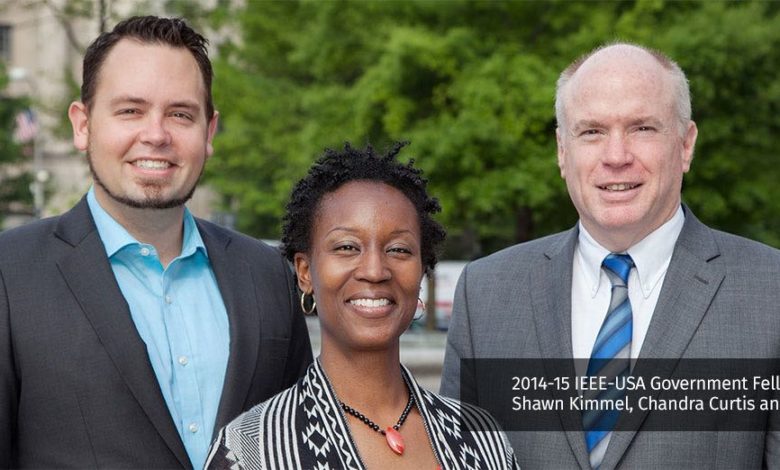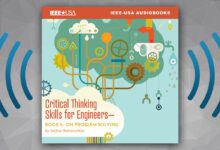
When Shawn Kimmel arrived in Washington, D.C. in September 2014 to begin his IEEE-USA Congressional Fellowship, he was looking forward to a year of contributing his strong technical expertise on Capitol Hill. But he was also concerned about the legislative body’s well-known dysfunction, and how this might affect his ability to be effective.
Now, looking back on his fellowship experience, Kimmel says his hopes were fulfilled to provide his knowledge about transportation R&D, energy and the environment. Moreover, he is pleased with the insights he gained about how policy is made, including the types of political interactions that drive the dysfunction.
“I was lucky to have served in the office of Representative Daniel Lipinski, who represents the Third Congressional District of Chicago,” says Kimmel. “What I really enjoyed was how he works in a bi-partisan fashion to co-sponsor bills from both sides of the aisle. It was great to see that the art of compromise hasn’t been lost ” he’s a champion at it.”
Kimmel, who is an IEEE Member, adds that Rep. Lipinski is also a graduate systems engineer. “Working with someone on the Hill who has a technical mind was a real perk for me,” notes Kimmel. He is a Lead Technologist at Booz Allen Hamilton in Washington, D.C., where he consults on autonomous vehicle technology.
His other experiences as an IEEE-USA Congressional Fellow include managing the STEM Education Caucus for the House of Representatives. He worked with STEM education stakeholders, organizing events and policy briefings.
For Bob Bartolo, the other 2014-15 IEEE-USA Congressional Fellow, one reason that he applied was his concern for the implications of climate change, and the current lack of a workable, effective plan to minimize carbon emissions. An IEEE Member, he was a research scientist for almost 20 years with the Naval Research Laboratory, and the University of Maryland, College Park, where he explored photovoltaic technologies for renewable energy. Currently, he is an AAAS Executive Branch Fellow with the Office of Fusion Energy Sciences, where he is investigating how to make fusion energy a reality.
“During the placement period for new Congressional Fellows, I sought out offices dealing with energy and environmental issues,” he says, “and I ended up working for Senator Bob Casey of Pennsylvania.”
One of his first assignments was helping to write a 22-page response to the Environmental Protection Agency’s Clean Power Plan (CPP). “The response offered recommendations to strengthen the CPP, and it included a strategy to reduce carbon emissions,” Bartolo says. He also worked on the Clean Vehicle Corridors legislation to promote the adoption of an electrical charging and hydrogen fueling infrastructure along the nation’s highways.
As it turned out, he and Kimmel both had good reason to celebrate on 4 December 2015. That’s when President Obama signed into law a five-year, $305-billion highway bill known as FAST Act ” Fixing America’s Surface Transportation. It is the first long-term national transportation spending package in a decade. During their year as IEEE-USA Congressional Fellows, both worked independently on standalone bills, seeking to get as many ideas from each of them as short sections in the larger highway bill. The two fellows interacted with the respective committee staff ” Kimmel on the House side, and Bartolo, the Senate side.
“It was a rare opportunity to work on a bill that progressed from inception to passage within one year,” says Kimmel. “Also, at least six committees of jurisdiction were involved, which made it an especially complex, dynamic legislative process.”
For IEEE Senior Member Chandra Curtis, the third of the 2014-15 IEEE-USA Government Fellows, her year was packed with different ” but enlightening ” experiences.
Curtis* received the IEEE-USA Engineering & International Development Fellowship, which she applied for to broaden her career possibilities. A senior engineer with Space and Naval Warfare Systems Center (SSC) Atlantic in Charleston, South Carolina, she was seeking to learn new skills as a supervisor and get a sense of executive leadership. “There are many training opportunities for entry- and executive-level managers, but not so many for those at my level,” says Curtis. “The International Development Fellowship offered what I was looking for, and it put me on a path toward strategic thinking.”
She explains her focus was to identify process inefficiencies, recommend improvements and establish guidance on using information platforms for experimentation, learning, collaboration and sharing innovations. “But my biggest accomplishments were adapting to an entirely new culture and being able to operate in this new world,” she says.
Her duties as an IEEE-USA Fellow with the U.S. Agency for International Development (USAID) differed greatly from her SSC Atlantic responsibilities. While with USAID, Curtis worked with a then-new department within the federal agency ” to examine its innovation process, provide them with data about it, and advise them at what point they could expect to see improvement. At SSC Atlantic, Curtis’ responsibilities include assessing and developing R&D for new technologies ” for use in a range of advanced systems and subsystems ” including command, control and communications.
Reflecting on their diverse experiences, the three 2014-15 IEEE-USA Government Fellows agree they contributed their knowledge in key areas, while also gaining valuable new insights. For Shawn Kimmel, Congressman Lipinski’s membership on both the Committee on Science, Space and Technology, and the Committee on Transportation and Infrastructure were ideal opportunities; he was able to share his technical expertise, as well as learn how the government runs. He says that sitting in on committee meetings gave him a new understanding about how deals get struck. “It was about cultivating relationships and trust ” having an appreciation for the other person’s position,” he comments.
Bob Bartolo notes that one of the frustrations of working on the Hill is dealing with the pessimism that a given piece of legislation will actually go anywhere.
“Remember, roughly 10,000 bills are introduced, and only 300 are passed,” he says. But as he experienced with the FAST Act, many of the concepts in individual bills are eventually incorporated into a larger one. He emphasizes that the lesson is to work to get your bills introduced and referred to committee ” with several co-sponsors, if possible.
While at USAID, Chandra Curtis volunteered to help staff the agency’s booth at the Washington, D.C. Maker Faire, a global movement that encourages a wide variety of innovators to show their new devices and to share ideas, tools and skill sets. She also attended a Fail Fest sponsored by USAID contractors and subcontractors, which she says gave her some fresh perspectives on innovating and the “failing fast” concept.
“Research is all about failure,” she says. “If you learned something from the experience, share it with the community and move on. It’s okay to make mistakes, if you learn from it.”
Curtis “absolutely” recommends applying for a Government Fellowship. “Every person has to be proactive about managing his or her career,” she states. “My success depends on me, and I can’t hold anyone else responsible for that.”
Kimmel looks back on his fellowship as “a great opportunity to meet a lot of other people genuinely interested in improving the nation.” He adds, “It will probably be one of the favorite years of my life.”
Applications are being accepted until 15 January 2016 for 2016-17 IEEE-USA Congressional, State Department Engineering and Diplomacy, and USAID Engineering & International Development Fellowships. Details are available at https://ieeeusa.org/about/.
*Disclaimer: Chandra Curtis’ comments are her own, and do not reflect the official position of her employer.
Helen Horwitz is an award-winning freelance writer who lives in Albuquerque, N.M. She was with IEEE from 1991 through 2011, the first nine as Staff Director, IEEE Corporate Communications.






